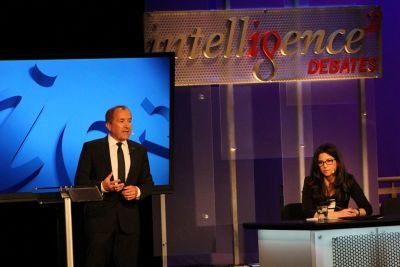Hate to say this, but skeptics, please be more curious

Recently, I enjoyed reading Ayaan Hirsi Ali’s “Why I am now a Christian.” Ali detailed her journey from Islam to atheism and then to becoming a Christian. Her story is fascinating and compels the comprehensiveness and uniqueness of the Christian worldview. Nevertheless, I also appreciate reading counter-perspectives and so I read Michael Shermer’s article, “Why I am not a Christian: a response to ... Ali’s declaration.”
I expected Shermer to highlight the usual points. He emphasized how there isn’t enough evidence for the Christian faith; that reason and science have allowed human flourishing; that morality doesn’t need God; that whatever we don’t know now could eventually be answered scientifically and become part of the ken of naturalized knowledge.
I believe it’s not a matter of debate anymore. I think it’s in every inquirer’s best interest that the term “skepticism” be replaced with “curiosity” in order to engender deeper thinking and fruitful discussion.
In my article, “Atheism’s obsession with God: is it ‘cultural theism’?,” I wrote that Shermer “is a likeable person” and I wish to now add sincerely that he is a decent skeptic. I have already addressed Enlightenment humanism in “Has denying the Christian God become intellectually disordered?,” “Skepticism, cultural confusion and the Christian faith,” and “Freethinking vs. faith: Which one brings true freedom?” Again, it’s time to encourage people to think for themselves by emphasizing curiosity.
Shermer defined atheism and noted how it is not a basis for addressing global problems. That’s fair enough. In doing so, however, he also upheld a brand of skepticism about the Christian faith, which I believe inherently deters deeper thought. As he wrote,
Atheism just designates a lack of belief in God. Full stop ... These descriptors are linguistic place-holders for mysteries we have yet to explain. Once explained, they move into the realm of the natural and the normal. If there is a realm of the supernatural or the paranormal, there is no way for a natural and normal being like us to perceive or understand it.
Inferential knowledge about God has compelled many reasonable people. Here it is conveniently dismissed by a “full stop” demand for empirical attestation. This brand of skepticism — “there is no way” — cannot spark the depth of thought that has always been characteristic of thinkers who were curious about matters of truth.
The Judeo-Christian heritage is perhaps the longest running cross-generational history over millennia and is ultimately a proposition to the intangible. “In the beginning God” is a claim that deep thinkers continue to take seriously. Countless people from all walks of life have joyfully and confidently discovered that Jesus is “the way, the truth and the life.” Of course there have been unbelievers. So what? The point is to let curiosity about human existence flourish, so people can think for themselves about the God questions.
Shermer’s skepticism seems to halt curiosity about where we came from, why we are here, and whether the grace of God can be real. He framed his response by skeptically pronouncing that it’s “not possible for ... us to understand.” This “not possible for us” should be restricted to those who wish to think like him, and leave everyone else to be curious and make up their own mind.
Furthermore, I honestly don’t understand where Shermer gets the philosophical justification to stimulate thinking by a strict supplanting of Christian faith. For example, he values “the rule of law” in his view of Enlightenment humanism. Who makes the rule? Why so? Is it whoever is stronger intellectually, or politically, or economically, or physically, and then on what ultimate basis do the weaker have to contest? Shouldn’t seekers be allowed to have the curiosity to think about a theistic explanation that has always been a “strong argument”? Shouldn’t the Moral Law giver be part of thoughtful considerations? I realize that Shermer would probably concede that people are free to think as they wish, but his skepticism by definition doesn’t allow enough curiosity to encourage deeper thinking.
Let’s then eliminate the taboo that forbids students to learn how distinguished astrophysicists are making a scientific case for the “God hypothesis.” Why are educators not permitting students to think and decide for themselves? Some would reply because it’s religion. Why predetermine that decision for students? Why not allow them to decide as they educate about the how? What is the point of respecting the minds of students if educators are deciding for them? Aren’t these placing limits on thinking and dampening curiosity?
You may be interested to know what happened not long ago when a professor structured a course that encouraged students to think about the human dimensions being suggested by modern scientific observations. In his own words,
I discovered that my astronomy students were fascinated by modern discoveries in physics related to the origin and fine tuning of the universe, and by questions raised by those discoveries, questions concerning purpose and the meaning of life. So I approached the chair of the Department of Physics and Astronomy ... He suggested ... to introduce a course at the interface of science and human concern. So, I drafted a course ... the course was reviewed positively ... and demand for the course remained brisk.[1]
Students were enthralled, saying, that the “conversations were fascinating, engaging, and challenging in the best of ways. We enjoyed stretching our minds.” [2] Powerful entities placed enormous pressure to have the course canceled, and so it was. I believe students were served an injustice. What can be so wrong about nurturing a curious intellectual appetite and challenging students to think deeply within the auspices of modern science? Why are people being discouraged from making up their own minds? Curiosity is being suppressed.
Ali made up her own mind. As a former Muslim, and then an atheist who associated with high-profile atheists, she must be well informed of Shermer’s brand of skepticism. She wrote, “there is a better way to manage the challenges of existence than either Islam or unbelief had to offer.”
Her declaration emphasized that the Christian faith provides unique answers for the complexities of humanity in today’s world. What engendered this interesting journey? I believe it was curiosity. She apparently exercised deeper thinking than Shermer’s brand of skepticism.
1. Eric Hedin, Canceled Science: What some atheists don’t want you to see (Discovery Institute: Seattle, 2021), 11, 13.
2. Ibid., 25-26.
Marlon De Blasio is a cultural apologist, Christian writer and author of Discerning Culture. He lives in Toronto with his family. Follow him at MarlonDeBlasio@Twitter




























